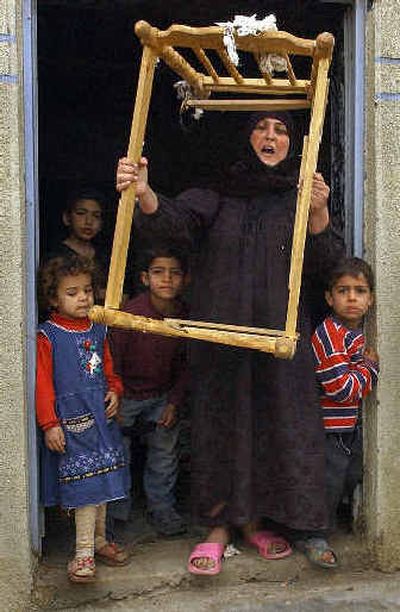U.S. raids homes in Iraq offensive

BAGHDAD, Iraq – U.S. Marines broke down doors and raided houses Monday on the second day of an offensive aimed at cracking down on insurgent activity in several troubled cities west of Baghdad.
The forays occurred as Shiites of the winning United Iraqi Alliance met in Baghdad to hash out a final prime ministerial candidate for the newly elected 275-member National Assembly.
Debate has intensified among members of the alliance, who formed a 21-member committee to decide on two nominees for the job because they could not agree on one candidate.
The two main candidates have been the former Pentagon favorite, Ahmad Chalabi, a secular Shiite, and Ibrahim al-Jaafari, the interim vice president.
But the race may get more complicated following reports that the Shiites’ initial pick for prime minister, Finance Minister Adel Abdul-Mahdi, could return as a compromise candidate. Abdul-Mahdi, who has close ties to Iran, dropped out last Wednesday.
Meanwhile, gunmen in the northern city of Mosul abducted an Iraqi television presenter, an official from her network said Monday. Raiedah Mohammed Wageh Wazan was abducted by several masked gunmen Sunday night while she was returning home, said the official, speaking on condition of anonymity.
The U.S. military said insurgents targeted the local TV station “several times in the past week because they have been broadcasting programs that highlighted the negative effects of insurgent activity. Those programs have had rapidly growing support from Iraqi citizens and therefore have caused the station to be targeted.”
The U.S. announcement added that “insurgents contacted the station and threatened to continue to target employees.”
Detainees released
Two Indonesian journalists and their Jordanian driver missing since last week were freed by militants and arrived safely Monday at the Iraq-Jordan border, according to a spokeswoman for Metro TV, their employer. The three were abducted last week outside Ramadi, west of Baghdad.
A video delivered anonymously to Associated Press Television News in Baghdad on Monday apparently showed the two journalists – Meutya Viada Hafid and Budiyanto, who like many Indonesians goes by one name – shaking hands with a militant before they were released.
A masked person in the video, reading from a notebook, said, “Based on the good will they showed, and respecting the feelings of brotherhood and Islam between the two countries, and respecting the Indonesian anti-occupation role, we decided to release the two journalists without any conditions and ransom.”
Indonesia, the world’s largest Muslim country, was critical of the U.S.-led 2003 invasion of Iraq, and has refused to send troops to the country.
In Ukraine, which did send troops, more than 2,000 protesters rallied Monday in front of the president’s office in downtown Kiev to demand the immediate withdrawal of 1,650 Ukrainian soldiers from Iraq. President Viktor Yushchenko, who took office in January, told the crowd that that the soldiers “fulfilled their mission,” but added that a pullout had to be coordinated with allies.
Six explosions boomed through the capital before midday. The cause of the blasts was not immediately known. Footage from Associated Press Television News showed U.S. troops treating an American soldier apparently injured in one of the blasts, which overturned a Humvee in the southern Doura neighborhood.
In Ramadi, U.S. Marines fanned out across the city, setting up checkpoints, searching cars and sealing off areas to prevent people from entering or leaving as they carried out raids. The operation came one day after launching the operation and putting in place a nighttime curfew.
Iraqi Maj. Abdul Karim al-Faraji said troops detained a prominent Sunni Muslim sheik, Mohammed Nasir Ali al-Ijbie, who heads the al-Bufaraj tribe, along with 12 of his relatives.
The new operation was under way in several other Euphrates River cities in Anbar, including Heet, Baghdadi, Hadithah and the provincial capital Ramadi, the military said. Hadithah residents reported parts of the city were bombarded by coalition aircraft overnight. There was no word on casualties.
On Saturday, an American soldier was killed in Mosul by small-arms fire, the U.S. military said Monday, without elaborating.
List of demands
As the Shiite majority prepared to take control of the country’s first freely elected government, tribal chiefs representing Sunni Arabs in six provinces issued a list of demands – including participation in the government and drafting a new constitution – after previously refusing to acknowledge the vote’s legitimacy.
“We made a big mistake when we didn’t vote,” said Sheik Hathal Younis Yahiya, 49, a representative from northern Nineveh. “Our votes were very important.”
He said threats from insurgents — not sectarian differences — kept most Sunnis from voting.
Sunnis make up 20 percent of Iraq’s population of 26 million; Shiite make up 60 percent.
Gathering in a central Baghdad hotel on Sunday, about 70 tribal leaders from six provinces tried to devise a strategy for participation in a future government. There was an air of desperation in some quarters of the smoke-filled conference room.
“When we said that we are not going to take part, that didn’t mean that we are not going to take part in the political process. We have to take part in the political process and draft the new constitution,” said Adnan al-Duleimi, the head of Sunni Endowments in Baghdad.
Meanwhile, a powerful Sunni organization believed to have ties with the insurgents sought to condemn the weekend attacks largely aimed at Shiites that left nearly 100 Iraqis dead.
“We won’t remain silent over those crimes which target the Iraqi people Sunnis or Shiites, Islamic or non-Islamic,” Sheik Harith al-Dhari, of the Association of Muslim Scholars, told a news conference.
Iraqis, he said, should unite “against those who are trying to incite hatred between us.”